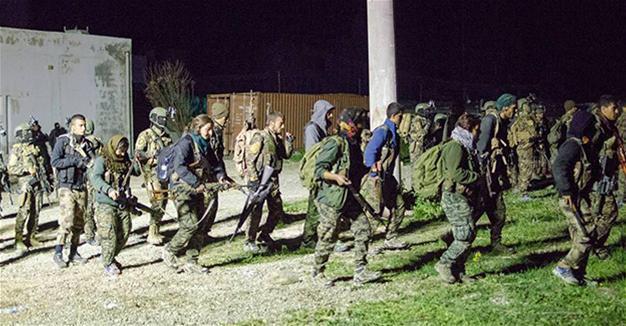US helicopters, special ops take part in Syrian militia airlift
WASHINGTON

Forces such as Apache helicopters, U.S. Marine artillery and special operation troops were part of a U.S.-led coalition operation to air drop Syrian militia into an area near the Islamic State of Iraq and the Levant’s (ISIL) stronghold Raqqa, a U.S. official said on March 22.
The air drop of Syrian Democratic Forces (SDF) near the town of Tabqa in northern Syria was the first time the coalition had carried out such a mission, Colonel Joseph Scrocca, , a spokesman for the US-led coalition helping local fighters, told reporters, according to Reuters.
Tabqa Dam at the southern end of Lake Assad is about 55 kilometers west of Raqqa, which ISIL views as the capital of its supposed “caliphate.”
The ISIL-held facility provides electricity to much of the region and its destruction would result in widespread flooding.
Scrocca said U.S. support came overnight May 21-May 22 via Apache helicopter gunships, airlifts, air strikes and advice to the SDF, an Arab-Kurdish alliance.
A U.S. Marine artillery battery is also helping out, AFP reported.
In a first, U.S. forces helicoptered an unspecified number of Arab SDF troops to Taqba, meaning they are now behind ISIL lines as they try to secure the dam.
Scrocca said the area around it is effectively a “command and control center for terrorist attacks against the West” and home to numerous foreign fighter training camps.
“Seizing Tabqa will give the SDF a strategic advantage and a launching point needed for the liberation” of Raqqa, Scrocca said.
The SDF has been working for months to encircle Raqqa before pushing into the city proper.
He said that about 75 to 80 percent of the forces air dropped were members of the Syrian Arab Coalition group and the remainder were from another part of the SDF, some of whom were Kurdish fighters.
“DOD: Last night, U.S. military forces supported multi-pronged offensive by Syrian Democratic Forces behind #ISIS lines to secure Tabqa Dam. U.S. military support included air movement & strikes, Apache close air support, Marine artillery, & special ops advice and assistance. Seizing Tabqa Dam will further isolate #Raqqa and deny #ISIS the ability to move fighters and supplies to defend dwindling strongholds,” tweeted Brett McGurk, special presidential envoy for Global Coalition to Counter ISIL.
US senator warns of ‘tough decisions’ with Syrian Kurds
The U.S.-led coalition fighting ISIL in Syria faces “tough decisions” on how much it should support Kurdish fighters in an offensive to reclaim Raqqa from the jihadists, Senator John McCain, who heads the Senate Armed Services Committee, said on March 22.
He said the Trump administration was weighing the thorny issue of giving the Kurds heavy arms and a major role in the upcoming battle, which would infuriate key ally Turkey, who sees the People’s Protection Unit (YPG), an offshoot of the outlawed Kurdistan Workers’ Party (PKK).
“The conundrum is that if you don’t use the Kurds, [the battle] takes a lot longer,” McCain told reporters.
“But if you do, you have an enormous challenge as far as relations with Turkey are concerned, including things like the use of İncirlik,” he added, referring to the Turkish air base used heavily by the coalition to hit ISIL targets in northern Syria.
McCain said he met recently with Turkish President Recep Tayyip Erdoğan, and the two spoke about the Kurdish issue.
Tillerson pledges safe areas for refugees
Meanwhile, U.S. Secretary of State Rex Tillerson said on March 22 the United States would set up “interim zones of stability” to help refugees return home in the next phase of the fight against ISIL and al-Qaeda in Syria and Iraq.
The top U.S. diplomat did not make clear where these zones were to be set up. He was addressing a meeting of 68 countries and organizations gathered in Washington to discuss accelerating the battle against ISIL.
“The United States will increase our pressure on ISIS and al-Qaeda and will work to establish interim zones of stability, through ceasefires, to allow refugees to return home,” Tillerson told the gathering at the State Department, where the former oil executive was hosting his first major diplomatic event.
Turkey has long promoted the establishment of a terror-free safe zone inside Syria for refugees to come back and settle in.
 Forces such as Apache helicopters, U.S. Marine artillery and special operation troops were part of a U.S.-led coalition operation to air drop Syrian militia into an area near the Islamic State of Iraq and the Levant’s (ISIL) stronghold Raqqa, a U.S. official said on March 22.
Forces such as Apache helicopters, U.S. Marine artillery and special operation troops were part of a U.S.-led coalition operation to air drop Syrian militia into an area near the Islamic State of Iraq and the Levant’s (ISIL) stronghold Raqqa, a U.S. official said on March 22.